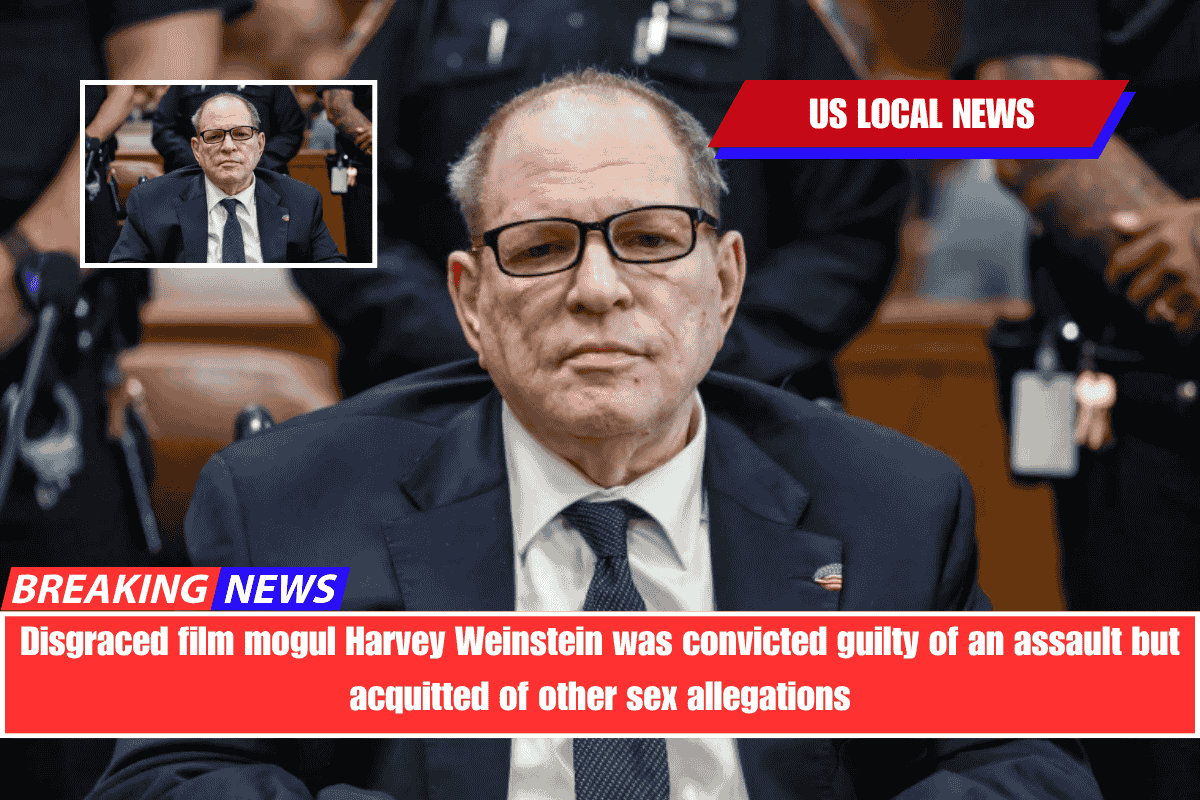Harvey Weinstein, the disgraced movie mogul, was convicted of a single count of criminal sexual act at his sex crimes retrial, bringing the years-long saga of the onetime Hollywood honcho-turned-#MeToo outcast to a close.
The jury found Weinstein not guilty of another count of criminal sexual act and returned no verdict on the single count of rape he faced. They deliberated for five days before returning a verdict on Wednesday.
Weinstein, 73, who arrived in Manhattan Criminal Court in a wheelchair after suffering a slew of health issues, looked at his lawyer in disbelief when the “not guilty” verdict was read, according to reports. He had decided not to testify for his defense during the six-week trial.
The former producer and co-founder of Miramax Studios pleaded not guilty to raping aspiring actress Jessica Mann in 2013 and forcing oral sex on two others in 2006. He denied the allegations, and his attorneys claim that everything that occurred between him and his accusers was voluntary.
He was previously convicted in New York, but the verdict was overturned by an appeals court.
Closing arguments in the retrial concluded on Wednesday, with Weinstein’s lawyer, Arthur Aidala, portraying him as the falsely accused “original sinner” of the #MeToo era, while Prosecutor Nicole Blumberg told jurors that Weinstein preyed on less-powerful women he believed would never speak out.
“According to the jury, he raped three women. “They all said ‘no,'” Blumberg explained.
“We heard a lot about ‘policing the bedroom’ yesterday,” Blumberg said, alluding to Aidala’s final argument on Tuesday. “We don’t want to police bedrooms either – unless you’re forcibly raping someone inside them.”
On Tuesday, Aidala accused the alleged victims of lying on the stand.
“They’re lying about what happened. “Not about everything, but about a small slice – just enough to turn their regret, their buyers’ remorse, into criminality,” Aidala told the accusers.
During his closing, he veered into folksy jokes, sometimes re-enacting witnesses’ behavior, to argue that his client was engaged in a “courting game,” not crimes, according to the Associated Press.
However, Blumberg urged jurors to concentrate on Weinstein’s accusers and their days of grueling testimony.
“This wasn’t a ‘courting game,’ as Mr. Aidala claims. “This was not a ‘transaction,'” Blumberg responded. “This was never about ‘fooling around.’ It was about rape.”
Aidala contended that everything that occurred between the ex-producer and his accusers was a voluntary, albeit “transactional,” exchange of favors. The attorney accused prosecutors of “trying to police the bedroom” by focusing on the man dubbed “the poster boy, the original sinner, for the #MeToo movement.”
“They tried to do it five years ago, and now there’s a redo, and they’re trying to do it again,” he told the judge.
His hours-long summary covered everything from the acclaimed, Weinstein-co-produced 1994 film “Pulp Fiction” to his own marriage and his grandmother’s Italian gravy, occasionally playing for — and receiving — laughs from jurors and Weinstein.
Aidala portrayed the former studio boss as a self-made New Yorker, while portraying Weinstein’s accusers as troubled and cunning “women with broken dreams” who plied him for movie opportunities and other perks, engaged with him for years, and then turned on him to cash in on his #MeToo downfall. All three were compensated through legal proceedings separate from the criminal trial.
Blumberg argued that Weinstein took a sexual “no” as a cue to “push a little bit more, and if they still say no, just take it anyway.”
She claimed that his accusers maintained friendly contact with Weinstein because they were attempting to work in entertainment and feared their careers would be ruined if they crossed him.
“He chose people who he thought would be the perfect victims, who he could rape and keep silent,” said the state’s attorney. “He underestimated them.”
Weinstein spent decades as one of the most powerful figures in the film industry. In 2017, allegations of sexual assault and harassment derailed his career, sparking the #MeToo movement, which seeks accountability for sexual misconduct. More than 100 women, including well-known actresses, have accused Weinstein of misconduct.
He was eventually found guilty of sex crimes and sentenced to prison in New York and California. His California appeal has not been decided.
Since the New York retrial began on April 23, prosecutors have called more than two dozen witnesses. The prosecution focused on Weinstein’s three accusers, who faced days of questioning.
In often graphic and sometimes tearful testimony, the women claimed the Oscar-winning producer used his celebrity status to prey on them.
Jessica Mann, who accused Weinstein of rape, met him while working as a hairstylist and aspiring actress. The sexual assault accusers were also pursuing careers in entertainment: Miriam Haley was a production assistant and producer, and Kaja Sokola was a teenage model who wanted to act.
Prosecutors have added Sokola’s allegations to the case for retrial. However, some of the other accusers from the first trial did not participate in the second. The appeals court ruled that including their unproven accusations was prejudicial.
Weinstein, who has been held in New York City’s Rikers Island jail since his conviction was overturned, now faces a maximum sentence of 29 years in prison.
He is already likely to spend the rest of his life in prison, having received a 16-year prison sentence after being found guilty of rape in California in December 2022.









